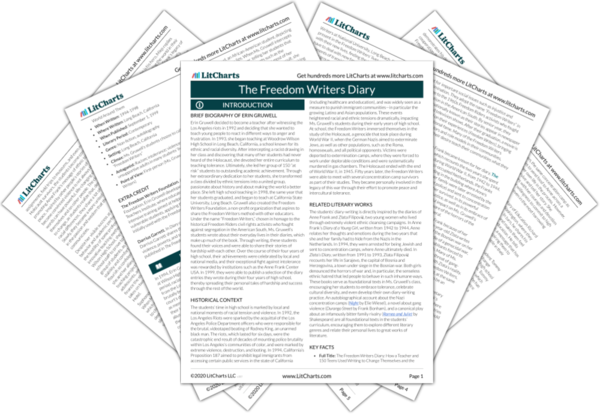Zlata Filipović Quotes in The Freedom Writers Diary
They say America is the “Land of the Free and Home of the
Brave,” but what’s so free about a land where people get killed? […] I am a fifteen-year-old teenage boy whose life seems to be similar to yours. In your diary you said you watched out for snipers and gunshots. I watch out for gangsters and gunshots. Your friends died of gunshots and my friend Richard, who was fifteen, and my cousin Matthew, who was nineteen, also died of gunshots. The strange thing is . . . my country is not in a war. (Or is it?)
I have always been taught to be proud of being Latina, proud of being Mexican, and I was. I was probably more proud of being a “label” than of being a human being, that’s the way most of us were taught. Since the day we enter this world we were a label, a number, a statistic, that’s just the way it is. Now if you ask me what race I am, like Zlata, I’ll simply say, “I’m a human being.”
When Zlata wrote about Bosnian children becoming the “soldiers” and the soldiers becoming “children,” at first I didn’t get her meaning. After hearing Tony’s story, I understood. In war the innocence of a child is lost, and though the soldiers fee I theirs is a worthy cause, they behave like children when trying to achieve their goals. Knowing that a grown man entered a child’s bedroom stealing his innocence makes me sad.
Zlata said writing was her salvation during the war and it kept her sane. She suggested that writing might be one of the best vehicles for some of my students to escape their horrific environments and personal demons. Even though they’re not held captive in an attic or dodging bombs in a basement, the violence permeating the streets is just as frightening—and just as real.

Zlata Filipović Quotes in The Freedom Writers Diary
They say America is the “Land of the Free and Home of the
Brave,” but what’s so free about a land where people get killed? […] I am a fifteen-year-old teenage boy whose life seems to be similar to yours. In your diary you said you watched out for snipers and gunshots. I watch out for gangsters and gunshots. Your friends died of gunshots and my friend Richard, who was fifteen, and my cousin Matthew, who was nineteen, also died of gunshots. The strange thing is . . . my country is not in a war. (Or is it?)
I have always been taught to be proud of being Latina, proud of being Mexican, and I was. I was probably more proud of being a “label” than of being a human being, that’s the way most of us were taught. Since the day we enter this world we were a label, a number, a statistic, that’s just the way it is. Now if you ask me what race I am, like Zlata, I’ll simply say, “I’m a human being.”
When Zlata wrote about Bosnian children becoming the “soldiers” and the soldiers becoming “children,” at first I didn’t get her meaning. After hearing Tony’s story, I understood. In war the innocence of a child is lost, and though the soldiers fee I theirs is a worthy cause, they behave like children when trying to achieve their goals. Knowing that a grown man entered a child’s bedroom stealing his innocence makes me sad.
Zlata said writing was her salvation during the war and it kept her sane. She suggested that writing might be one of the best vehicles for some of my students to escape their horrific environments and personal demons. Even though they’re not held captive in an attic or dodging bombs in a basement, the violence permeating the streets is just as frightening—and just as real.











